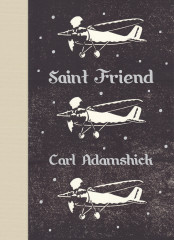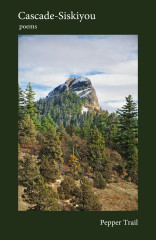The deadline for submitting books to the 2017 Oregon Book Awards is Friday, August 26, 2016. In the meantime, we’re sharing the judge’s comments on the 2016 finalists from each category. Remember that the 2017 OBAs include the Award for Drama, and the original publication dates and guidelines for this category are different. Click here to download guidelines for all of the upcoming awards.
Spencer Reece is a poet and priest. His first collection, The Clerk’s Tale, won the Bakeless Prize in 2003. His poems have been published in The New Yorker, Poetry, The American Scholar, and The New Republic. He works for the Bishop of Spain for the Reformed Episcopal Church, Iglesia Española Reformada Episcopal.
Here are his comments on the 2016 Oregon Book Awards finalists for the Stafford/Hall Award for Poetry:
by Carl Adamshick
This book, with its ten poems, works on the reader incrementally: each time you pick it up more scenery appears, like a play slowly building. Often what seems to make a decent book of poems, in my humble opinion, is simply the reader’s desire to return again and again to the work. What causes that reaction who really knows in the end. Like seeing a photograph or a painting in the museum, the eye or the mind lingers for a time, and, perhaps, you don’t entirely understand what it is that is in front of you. The artist has seen something you hadn’t imagined or thought about in exactly that way. Why does Velazquez use that dark sickly green behind Christ? Why, for heaven’s sake, did Arbus capture the mentally handicapped with Halloween masks on? Why name a book Saint Friend? Friends are no saints normally, saints are usually unreachable. So the two words in the very title create a kind of spark in your mind. And why the focus on friends for a young poet? Why not romantic love? Friends matter to this author: “friend to slam against me,/to hold me, to say they love me. I need mornings to ask for favors/and forgiveness.” In the center of the book is a moving sustained dramatic monologue in the voice of Amelia Earhart that moves between her childhood memories and her last hours on the flight where she mysteriously disappeared. The poet names his friends in the book in a series of short poems: Emily, Michael, Thomas. The book is a sort of manual of how to move through the world, whether flying or driving or walking or celebrating a birthday, all sanctified by friends. The sound he makes is wholly unique.
by Andrew Michael Roberts
This is a book you can’t help but pick up more than once, with lines and images not completely domesticated. Something feral and hungry and ready to bite here. There are individual lines and images that stay and linger with the reader: a snowman made “and then crucified” who the makers then “gave him tits,” or a poem called “give your grandmother a kiss” which goes: “I recall/the cannula’s forked throat,/the caramel scent of oxygen in it./her soft and/wasted cheek./nicotine./lipstick on the filter of/a just-sucked cigarette.” A snowman with cold breasts crucified and a grandmother’s caramel scent of oxygen. Things are turned inside out and upside down. These curious and sometimes poignant images hold the eye and the ear and the nose and the finger and the tongue to the page. Brilliant poet, write on, keep letting your poems out of their cages, there is much to be found here in a poem such as “easter 1982”:
they found that
lost girl
six miles
downriver
wrapped in
tyvek
and barbed
wire.
what was
Her name?
who
loved her?
The poet dictates a letter to “the world´s insatiable ear” in a sound following Plath´s “zoo-yowl.” We have the pleasure of receiving this dictation. The poems work like a series of charms, casting spells on a world, something to counter the “terrible loneliness,” our speaker addresses, a place where “a cloud/I love slowly/swallows/its fist.”
 In Absolutes We Seek Each Other
In Absolutes We Seek Each Other
by Jessica Johnson
Quiet, unassuming, these poems root themselves on the page, Johnson is grounded in science: microscopes, DNA. The poems seem to grow like cultures in petri dishes, a slow patient watching takes place here in her sounds. One poem I kept returning to is called “Artifacts,” and concerns the rental house the speaker shares with the mysterious M. It goes:
That day we wound the watch, it ticked a day or two,
Then stopped. We thought we’d paint the place
To make it ours (a blue in M.’s room she called Sleep,
My room a greenish slate), pass through the warped box
Cleanly, then on to better things. In fact we’d leave
Our artifacts — grease splatters on the wall
Beside the antique stove, hair on the linoleum.
The sound is humble and unassuming and her words lingered with this reader each time he picked up this book. Our author traces her life. Working in a greenhouse she writes: “We dropped/microscopic seeds on dirt; they grew; we staked/ the seedlings straight; they lived on light.” The miracle and marvel of nature is her world, time and again, and one begins to think this could apply to the poems themselves that also have been staked and now live with us.
by Pepper Trail
Here is a world of trees and plants and lakes and animals, Hopkins-like in that the poems feel like they are geysering out of some pen which is the poet’s solace, and Hopkins-like in their crunched, balled-up dynamic verbal energy: “from gray-green summits to emerald/along the creek, and from Doug-fir snag/the flicker laughed and laughed,/ and there I spent my day.” Like sketches or paintings done in the wilderness, each poem has a label at its bottom for the place where it was done. The grateful embrace and appreciation of nature enchanted me, I wanted to go to these mountains, these lakes, these trees, see these hummingbirds and these eagles. With threatening announcements in the papers and on TV of our natural world constantly being threatened, it helps to have these poems as a corrective. The poems are earnest in their appreciation, and you do not often find such earnestness in the world. They are humble and reverent:
This ant at my feet, this juniper, and myself
We all live the same number of days
All enter and leave the world alike
And are given the time between
Time enough to accomplish our own perfection
To grow, to express in the shape of our lives
The beauty of our afflictions
The worth of all the time there is
This poet finds worth in the natural world — the deer, the lizards, the trees, the jays — and where he witnesses miracles, is where he kneels. For a time, I had the good fortune to kneel beside him.
by John Witte
Fragmentary as dreams, these poems slide onto the page, captivating us with their wonder and their clarity. The poems are all written in the center of the page with spaces between phrases so that they look like eggs with cracks. Reading these poems is like being a pathologist looking at dreams on pap-smears through a microscope. They are searing and they are delicate. One called “Fledging” goes like this:
I awoke to singing
and clambered out of my crib
over the dresser to the small screen window
where I perched birds flickering around their nest
the hungry hatchlings featherless awkward I leaned
toward them I cannot say where I went flying
from the farmhouse in upstate New York
I came to in a white room the broken face
of my mother looking down with wires
attached to me a human child
How fragile and delicate the child portrayed in this poem! How fragile the world… The title signals the themes of this varied and captivating book; disquiet, a quiet that is not settled, where boys lose dogs, Van Gogh swallows his paints, and the electricity of new love surprises the poet. Hard questions are asked: “Have I made my life a willing instrument?” and “Why do birds sing so joyfully as the darkness comes on?” Poems I have often thought are quite close to prayer and prayer quite close to quiet. These poems exist in that thin place between hands holding a pencil or hands tapping a keyboard and hands clasped in prayer. Much is questioned, much is pondered, and as with George Herbert’s poem about prayer, by poem´s end, we find, perhaps, from reading these poems, that something has been understood a little better than before we picked up these pages.






